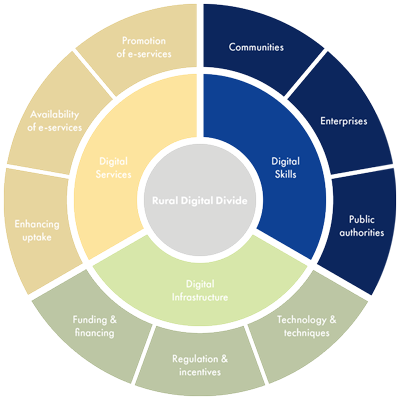Digital Skills
Limited access to and use of digital technologies in rural areas are accompanied by a lack of digital skills of different social groups (e.g. elderly people) and in businesses. This includes basic digital skills and competences, which allow individuals to interact online and consume digital goods and services as well as advanced skills, which empower the workforce to take advantage of technologies for enhanced productivity and economic growth. Digital literacy and the awareness of the possibilities digitalisation offers is a key driver for new business models, applications and services necessary to develop and contribute to the social cohesion and economic prosperity in Europe. To ensure that everyone can engage in and benefit from the digital economy and adapt rapidly to new and unexpected occupations and skill needs, education and training systems should place a stronger emphasis on promoting ICT generic skills, ICT specialist skills, and ICT-complementary skills, including foundational skills, digital literacy, higher-order critical thinking skills as well as social and emotional skills. Greater efforts are also needed to raise the skills of adults with weak literacy, numeracy and digital skills to help them to fully participate in the digital economy and society. The target groups for enhancing digital skills in rural areas are:
- Communities
- Enterprises
- Public authorities
CORA pilot regions will test face to face and online training methods with the aim of improving the level of local digital skills and competences.

communities

Awareness raising and training of citizens is key to enable a digital society and successfully exploit already existing networks, to ensure the future expansion and use of digital technologies. Measures need to be in place to improve a range of basic to advanced digital skills of different socio-economic groups of the society. These include:
- Digital literacy and basic digital skills for disadvantaged social groups such as elderlies to benefit from a wide range of digital services offered in their daily lives;
- Basic and advanced digital skills for students with high learning capacities at educational institutions;
- Advanced digital skills for special target groups such as professional workforces who are active in different sectors of the economy & society.
enterprises

Small and Medium Sized (SMEs) enterprises shall be supported and empowered to benefit from the opportunities offered by digital technologies. Digital competences of enterprise employees need improvements with the aim of increasing the use of digital technologies in the process of design, service and product delivery. While recent years have shown a growing trend towards buying ICTs as a service, SMEs lag behind in their adoption of cloud computing and other sophisticated digital technologies. It is essential to help promote the adoption of these digital technologies among SMEs, because they can help to overcome some of the traditional barriers to investing in digital technologies, including the often high, upfront sunk costs of these investments, and allow them to switch more rapidly from one technology to another to avoid being locked in.
public authorities

Awareness, leadership and interest of national, regional and local public administrations and politicians is key to successful and sustainable digital transformation in rural areas. Public authorities as the main providers of public services need to improve their compatibility and skills in planning, provision and delivery of advanced digital services to citizens and enterprises. As the main provider of public and welfare services, local and regional authorities require adequate knowledge and skills for future-proof development of their regions. This includes a certain level of awareness to develop future oriented digital strategies as well as competences to develop digitally enabled services in a responsive design manner for communities and businesses.

